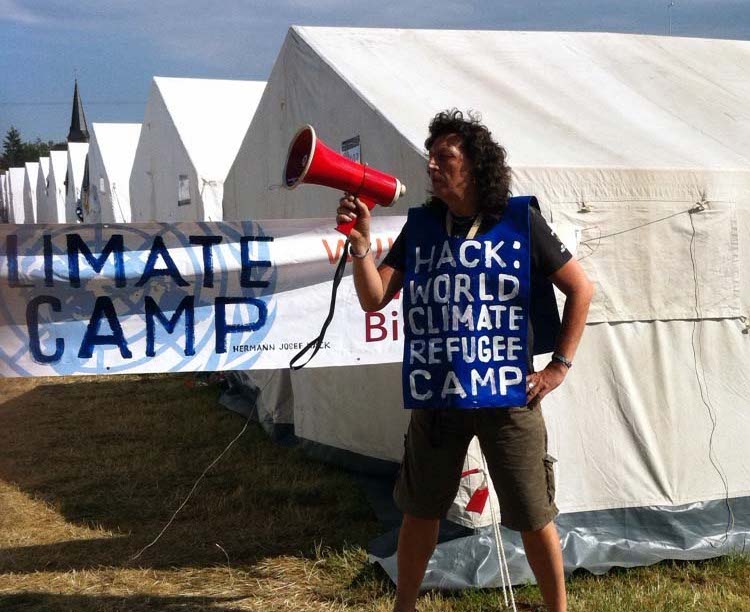

By SHIRIN HAKIM & MIRIAM ACZEL
There is a significant yet still under-researched connection between climate change and security-related risks. The frequency of extreme weather events, including flooding, severe droughts and other associated impacts of global warming are contributing to the reduction of crop yields, diminishing water resources, and ultimately impacting human livelihood. In some cases, these events have contributed to the migration of ‘climate refugees’ in order to meet their basic human needs, including access to water, food, electricity, and shelter. As a result, climate change is increasingly entering the policy arena as a significant security issue.
The IPCC’s 5th Report
In March 2014, the Intergovernmental Panel on Climate Change (IPCC) released findings from Working Group II of the 5th Assessment Report. The report, which was titled “Climate Change 2014: Impacts, Adaptation, and Vulnerability,” looks at both projected and observed impacts of climate change on human systems, and, importantly, what humans are doing to adapt. Some of the key findings include the fact that there is increasingly “strong evidence that human security will be ‘progressively’ threatened by climate change”.In addition, the report finds that climate change is already impacting both water and food security, and therefore human wellbeing and security. Further, sea level rise is increasing at a more rapid pace than the previous assessment report predicted, and is also already impacting human security.
The IPCC’s 6th Report
The IPCC’s 6th report contains a “Special Report on Global Warming of 1.5°C,” which was approved by international governments on October 8, 2018. The report tells an even more dire story, much more severe than any of the previous reports, discussing the drastic severity of the impacts that the globe will experience once we go beyond 1.5 degrees of warming. As the New Yorker reported:
“Ten million more people would be exposed to permanent inundation, and several hundred million more to ‘climate-related risks and susceptible to poverty.’ Malaria and dengue fever will be more widespread, and crops like maize, rice, and wheat will have smaller and smaller yields—particularly in sub-Saharan Africa, Southeast Asia, and Central and South America. Security and economic growth will be that much more imperiled.”
Climate: A Key Threat to United States National Security
Because of the increasingly frequent extreme weather events such as the recent hurricanes and typhoons, our changing climate poses significant potential impacts on national security and the safety and stability of humans globally. The relationship between climate and stability is therefore becoming a crucial point of discussion as increasing numbers of natural disasters threaten resilience amongst communities around the world.
In 2015, the United States National Security Strategy recognized global climate change as a key threat to national security. In December of 2017, the UN Security Council held its first meeting on climate and security, fostering an official home for these discussions, delegating a “Climate Change and Security Officer” that would serve the UN Secretary General and relay information regularly to the UN Security Council.
The US’s 4th National Climate Assessment
The United States’ 4th National Climate Assessment, published in November 2017, stated that climate change, although once considered an issue for a distant future, has moved firmly into the present. These national assessments were legislated by Congress in the 1990s–Volume 1 of the Fourth National Climate Assessment is “an authoritative assessment of the science of climate change, with a focus on the United States. This National Climate Assessment provides an in-depth look at climate change impacts on the United States, and details 12 overarching ways that climate change is alreadyaffecting and will increasingly impact our lives. This includes impacts on local communities, the economy, infrastructure, health, agriculture, water, ecosystems, and others. Importantly, the 4th Assessment warns that the window of time to prevent widespread dangerous effects is closing fast.
The UK’s Centre for Global Disaster Protection
On July 20th, 2017, the United Kingdom Government’s Department for International Development (DFID) announced plans for the Centre for Global Disaster Protection, an initiative in partnership with Germany and the World Bank to be based in London. The UK committed to providing up to £ 30 Million to support the new Centre dedicated to collaborations among researchers, insurance firms, and policymakers on how to develop support mechanisms for the poorest nations to improve disaster preparedness, and reduce the economic burden of climate-related disasters.
Prime Minister Theresa May spoke at the G20 meetings in Germany last year on the critical status of the drought in East Africa as a potential priority point for the initiative, stressing the importance of global access to insurance.
G7 governments have been seeking solutions to access to insurance in developing nations for some time now, aiming to insure 400 million individuals against the dangers of climate disasters by the year 2020. Lord Nicholas Stern of the London School of Economics commented on the Centre, stating, “The creation of the Centre should be viewed in the context of the G20 leaders’ communiqué earlier this month, which explicitly stated that their highest priority is strong, sustainable, balanced and inclusive growth, and to align with the 2030 Agenda for Sustainable Development.”
The Centre aims to design innovative, affordable and efficient finance mechanisms that provide the greatest benefits to the most marginalized members of society. Every £1 dedicated to the preparedness of drought and flood leads to savings of roughly £3 in aid efforts.Thus, the objective of such preventative efforts is to curtail the cost of disasters for regions that are already at risk and reduce overall consequences on individuals. Furthermore, the Centre will support global climate resilience solutions through the Paris Agreement pledge of $100 billion in funding climate change mitigation and adaptation mechanisms in developing countries.
Grantham Institute’s Recent Briefing Paper
A recent briefing paper by Imperial College London’s Grantham Institute for Climate Change and the Environment examines climate change – and the responses to it – as a security ‘threat multiplier’. The paper, “Climate change, low-carbon transitions and security” by Dr Amiera Sawas, Dr Mark Workman and Dr Naho Mirumachi, explores the increased risk of conflict that climate change can induce, and provides suggestions on how to decrease the likelihood of conflicts stemming from climate-change related incidents.
We need further research like this—leading to global action—on mitigation of climate impacts and linkages between national security, rise in climate refugees due to drought and food shortages, and potential effects of natural disasters and other changing climate and weather patterns on crucial infrastructure. By promoting dialogue, further research, and discussion among researchers, policy makers, and global citizens, we can better prepare for both environmental and human impacts of climate change and improve resilience and global security and stability.
Shirin Hakim is a PhD Candidate at Imperial College London’s Centre for Environmental Policy, and a member of The Grantham Institute Science and Solutions for a Changing Planet Doctoral Training Partnership (SSCP DTP). Her research is focused on the impact of economic sanctions on the environment with a focus on Iran.
Miriam Aczel is a President’s Scholar PhD Candidate at Imperial College London’s Centre for Environmental Policy. Her research focus is on international energy science and policy, with a focus on mitigation of environmental and health impacts of shale gas. She is also co-founder and co-director of the Amir D. Aczel Foundation for Research and Education in Science and Mathematics, a nonprofit based in Cambodia.
Miriam is Director of Communications and blog editor for Leaders in Energy.



Leave a Reply